XVI National Convention on Entrepreneurship and Skill Development by Fair Trade India (FTF-I) – A Report
Fair Trade Forum-India (FTF-I) organized the XVI National Convention on Skill Development and Entrepreneurship, with a special focus on textiles, handlooms and handicrafts in Hyderabad from 1st to 2ndDecember, 2016. The event was held at Katriya Hotels and Towers, Somajiguda, Hyderabad.
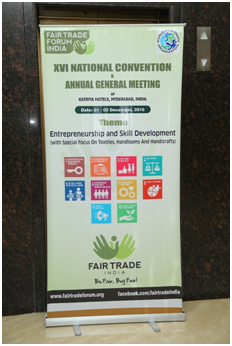 FTI- I works with more than 250000 producers – artisans and farmers – through more than 100 member organizations, to ensure a dignified income and overall development of artisans, farmers, workers in the unorganized sector. FTF-I contributes to poverty alleviation and sustainable development by building a broader, multi-stakeholder movement for Fair Trade, one that encompasses producers, workers, consumers, and people from various backgrounds.The main objective of the convention was to promote skill development and entrepreneurship in the Fair Trade Network by aligning with the National mission on Skilling India. Hence, most of the sessions focused on exploring synergies with the government’s efforts towards generating sustainable livelihoods through skill development and entrepreneurship. This also brought into the limelight sustainable models of entrepreneurship, innovative practices in inclusive development of artisans and different ways of scaling up small enterprises by exploring global markets.
FTI- I works with more than 250000 producers – artisans and farmers – through more than 100 member organizations, to ensure a dignified income and overall development of artisans, farmers, workers in the unorganized sector. FTF-I contributes to poverty alleviation and sustainable development by building a broader, multi-stakeholder movement for Fair Trade, one that encompasses producers, workers, consumers, and people from various backgrounds.The main objective of the convention was to promote skill development and entrepreneurship in the Fair Trade Network by aligning with the National mission on Skilling India. Hence, most of the sessions focused on exploring synergies with the government’s efforts towards generating sustainable livelihoods through skill development and entrepreneurship. This also brought into the limelight sustainable models of entrepreneurship, innovative practices in inclusive development of artisans and different ways of scaling up small enterprises by exploring global markets.
Day – 1
The event began with the National Anthem, followed by a SarvDharam Prarthana by Ms. Pooja. Mr Ranvir Sisodia, Jt. Secretary FTF-I,conducted an “ice breaking” session where the participants introduced themselves and spoke about how they have been following the principles of Fair Trade as given below:
- Creating opportunities for economically disadvantaged producers
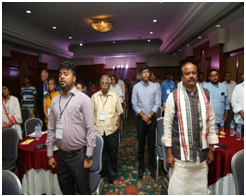
- Transparency and accountability
- Fair trading practices
- Payment of a fair price
- Ensuring no child labor and forced labor
- Commitment to non-discrimination, gender equity and women’s economic empowerment, and freedom of association
- Ensuring good working conditions
- Providing capacity building
- Promoting fair trade
- Respect for the environment
The welcome note
Ms. Sudeshna Mitra Woodhatch, Secretary FTF-I, welcomed the participants to the XVIth National Convention.
Ms Meenu Chopra, ED FTF-I, presented FTF-I and its work to the participants. Shehighlighted, through her presentation, how FTF-I was strengthening the Fair Trade Movement in India and creating an Impact by working with 100 plus members spread across India. The member organisations follow the 10 principles of Fair Trade, as laid down by World Fair Trade Organisation and invest a lot in building the capacity of the communities that they work with. The primary producer is the core of the Fair Trade movement. FTF-I members work in various sectors and produce textiles, handicrafts, handlooms, food and agro, body care products etc. FTF-I supports its members through capacity building and market facilitation, and works towards strengthening the Fair Trade movement through policy advocacy and generating more awareness. It partners with government, corporate bodies and international organizations for various projects. Currently, FTF-I is also exploring tourism as a potential sector and has also launched a Retail Brand- Fair Trade India that is being used by around 30 shops across India. She concluded by saying that Fair Trade is a ‘Trade that Empowers” and it also gives consumersthe power to make a difference simply through their purchases
The Inaugural Session
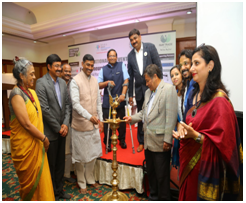 The inaugural session began with Rahul Saridena, Associate member FTF-I, inviting all distinguished guests on to the dais.He welcomed and introduced Chief Guest, Mr. Muralidhar Rao, National General Secretary, BJP; Mr. Chandramouli, Chairman, Khadi and Village Industries Commission(KVIC), Mr. Jaikanth Singh – NSDC; Ms. Roopa Mehta, WFTO and Mr, Chitra KC, WFTO Asia.
The inaugural session began with Rahul Saridena, Associate member FTF-I, inviting all distinguished guests on to the dais.He welcomed and introduced Chief Guest, Mr. Muralidhar Rao, National General Secretary, BJP; Mr. Chandramouli, Chairman, Khadi and Village Industries Commission(KVIC), Mr. Jaikanth Singh – NSDC; Ms. Roopa Mehta, WFTO and Mr, Chitra KC, WFTO Asia.
Pradeep Krishnappa, Vice –President FTF-I, invited the dignitaries to inaugurate the National Convention by lighting the lamp.
The launch of MyRoots.desi and the website for WFTO Biennial Global Conference in 2017.
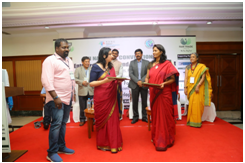 Mr. Pradeep Krishnappa spoke about the importance of digitalisation in today’s world and invited Sreerekha, Co-Founder Myroots.desi to the dais. Sreerekha introduced her e-portal Myroots.desi that connects desi products and the artisans to the consumers. An MOU was signed between FTF-I (represented by Ms. Meenu Chopra) and “MyRoots.desi” (represented by Sreerekha Madivala) to promote Fair Trade products using digital marketing. Mr. Muralidhar Rao launched the portal. Pradeep said that this as a good opportunity for the Fair Trade network to get into e-commerce.
Mr. Pradeep Krishnappa spoke about the importance of digitalisation in today’s world and invited Sreerekha, Co-Founder Myroots.desi to the dais. Sreerekha introduced her e-portal Myroots.desi that connects desi products and the artisans to the consumers. An MOU was signed between FTF-I (represented by Ms. Meenu Chopra) and “MyRoots.desi” (represented by Sreerekha Madivala) to promote Fair Trade products using digital marketing. Mr. Muralidhar Rao launched the portal. Pradeep said that this as a good opportunity for the Fair Trade network to get into e-commerce.
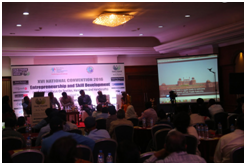 Pradeep further conveyed that FTF-I will be co-organising 14th Biennial Global Conference in November 2017. The teaser video for the Conference was launched .Roopa Mehta, board member WFTO launched an exclusive website for the Global Conference and spoke about the Global Conference. She said that we are at a stage where relevance of Fair Trade in sustainable development is being recognised. The Global Conference is expected to attract good number of participants from 70 countries across the globe. The Conference will see a convergence with the organic world through Organic World Conference and the launch of Fair Trade Charter. The Conference will be very relevant not only for Fair Trade producers, buyers and supporters, but also for a lot more people.
Pradeep further conveyed that FTF-I will be co-organising 14th Biennial Global Conference in November 2017. The teaser video for the Conference was launched .Roopa Mehta, board member WFTO launched an exclusive website for the Global Conference and spoke about the Global Conference. She said that we are at a stage where relevance of Fair Trade in sustainable development is being recognised. The Global Conference is expected to attract good number of participants from 70 countries across the globe. The Conference will see a convergence with the organic world through Organic World Conference and the launch of Fair Trade Charter. The Conference will be very relevant not only for Fair Trade producers, buyers and supporters, but also for a lot more people.
Mr Chitra K C, Head, President WFTO Asia briefed the audience about WFTO Asia and said that it is one of the key regional bodies with office in Thailand and it accounts for 144 members from Asia (out of 400 in the global body). He also talked about the lobbying that was needed to bring the Guarantee system across 19 countries. WFTO employs 75000 producers in 19 countries with150million euros annual turnover. The Guarantee system ensures that you are really following the 10 principles.
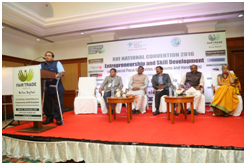 Mr Mallikarjun Iytha, President- FTF-I, delivered his address andinformed the delegates about the organisation’snew initiatives into policy and advocacy that have seen collaboration with Ministry of Skill Development and Entrepreneurship (MSDE). He also introduced the Chief Guest Mr Muralidhar Rao by describing his contribution to building the Swadeshi Movement in India and dedication to crafts, weavers and others in unorganized sector. He encouraged the audience to take social impact stories forward and discuss with the policy makers so that they know about the sacrifices from the members in building the ecosystem. He also said that event is dedicated to collaboration, partnerships and action plans as November is observed the Fair Trade month and next year, Delhi would be declared as the Fair Trade Capital of the world, for a week around the Global Conference.
Mr Mallikarjun Iytha, President- FTF-I, delivered his address andinformed the delegates about the organisation’snew initiatives into policy and advocacy that have seen collaboration with Ministry of Skill Development and Entrepreneurship (MSDE). He also introduced the Chief Guest Mr Muralidhar Rao by describing his contribution to building the Swadeshi Movement in India and dedication to crafts, weavers and others in unorganized sector. He encouraged the audience to take social impact stories forward and discuss with the policy makers so that they know about the sacrifices from the members in building the ecosystem. He also said that event is dedicated to collaboration, partnerships and action plans as November is observed the Fair Trade month and next year, Delhi would be declared as the Fair Trade Capital of the world, for a week around the Global Conference.
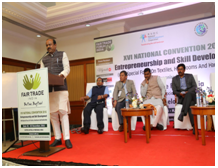 Mr. Chandramouli – Chairman, KVIC deliberated on possible collaboration between KVIC and FTF-I. He felt that the collaboration would be mutually beneficial and spoke about the partnership and action plan for skill development of Khadi weavers for poverty alleviation and dignified living. He drew a parallel between KVIC and FTF-I and stressed upon the need for skill development for capacity building. He discussed about the training programs at KVIC which include pottery, bee keeping, natural colours, carving from a list of 14 skills. He also talked about the infrastructural support, technology and marketing for a competitive business model for Khadi products. He said that the cluster programs haveliberalised the system and simplified the procedures and there is a need to create more opportunities in taking KVIC to global standards.
Mr. Chandramouli – Chairman, KVIC deliberated on possible collaboration between KVIC and FTF-I. He felt that the collaboration would be mutually beneficial and spoke about the partnership and action plan for skill development of Khadi weavers for poverty alleviation and dignified living. He drew a parallel between KVIC and FTF-I and stressed upon the need for skill development for capacity building. He discussed about the training programs at KVIC which include pottery, bee keeping, natural colours, carving from a list of 14 skills. He also talked about the infrastructural support, technology and marketing for a competitive business model for Khadi products. He said that the cluster programs haveliberalised the system and simplified the procedures and there is a need to create more opportunities in taking KVIC to global standards.
 Mr. Jaikant Singh – NSDC,hailed the association of NSDC with FTF-I. He stressed upon how reaching to the last producer is important to achieve the goal of sustainability. He invited FTI-I members to collaborate with NSDC to promote sustainability and reach the right target segment by making artisans a part of Recognition of Prior Learning (RPL) program. He talked about how the motto of “Be Fair and Buy Fair” can be strengthened by being a part of events like Pradhan Mantri Kaushal Mela under Prime Minister’s Kaushal VikasYojana.He discussed about how self-employment has an important role to play in a highly populous country like India to improve the demographic dividend.He stressed on the fact that at present only 0.9% of Indians are into entrepreneurship and how FTF-I can bring in more women entrepreneurs and scale up the GDP. He assured FTF – I of NSDC’s support in scaling up its activities.
Mr. Jaikant Singh – NSDC,hailed the association of NSDC with FTF-I. He stressed upon how reaching to the last producer is important to achieve the goal of sustainability. He invited FTI-I members to collaborate with NSDC to promote sustainability and reach the right target segment by making artisans a part of Recognition of Prior Learning (RPL) program. He talked about how the motto of “Be Fair and Buy Fair” can be strengthened by being a part of events like Pradhan Mantri Kaushal Mela under Prime Minister’s Kaushal VikasYojana.He discussed about how self-employment has an important role to play in a highly populous country like India to improve the demographic dividend.He stressed on the fact that at present only 0.9% of Indians are into entrepreneurship and how FTF-I can bring in more women entrepreneurs and scale up the GDP. He assured FTF – I of NSDC’s support in scaling up its activities.
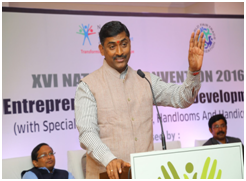 Mr. Muralidhar Rao, National General Secretary, BJPspoke about how trades are linked to our lifestyle and products are based on our needs. This is, in turn,based on taste and perception, which is related to values for which you live…. this discipline will create a habit for the product. Hence Fair Trade cannot disconnect with lifestyle; these products have a history and have a philosophical base that needs to be revived. Advocating the use of ‘desi’ or ethnic products and lifestyle, he shared several inspiring points. He urged not to confine FTF to selling commodities and products; FTF must represent philosophy of the product and create a market. He said, historically, Indian society has been diverse and intellectually richand now when we have the power of imagination, we need to recapture the richness and spirit to establish our cultural superiority. He discussed about the need to formally recognize the skills andancient knowledge which is obligatory to make Indian development story complete. He stressed upon incorporating the indigenous creativity in planningprocess; this should become mainstream we must have universities for artisans to create intellectual assets. He emphasized on how one has to live for the changeone believes in and not just propagate it, hence it required to adopt the relevant lifestyle to promote it.
Mr. Muralidhar Rao, National General Secretary, BJPspoke about how trades are linked to our lifestyle and products are based on our needs. This is, in turn,based on taste and perception, which is related to values for which you live…. this discipline will create a habit for the product. Hence Fair Trade cannot disconnect with lifestyle; these products have a history and have a philosophical base that needs to be revived. Advocating the use of ‘desi’ or ethnic products and lifestyle, he shared several inspiring points. He urged not to confine FTF to selling commodities and products; FTF must represent philosophy of the product and create a market. He said, historically, Indian society has been diverse and intellectually richand now when we have the power of imagination, we need to recapture the richness and spirit to establish our cultural superiority. He discussed about the need to formally recognize the skills andancient knowledge which is obligatory to make Indian development story complete. He stressed upon incorporating the indigenous creativity in planningprocess; this should become mainstream we must have universities for artisans to create intellectual assets. He emphasized on how one has to live for the changeone believes in and not just propagate it, hence it required to adopt the relevant lifestyle to promote it.
Shyam S. Sharma Memorial Lecture ByMr. David Wilcox, Founder, ReachScale
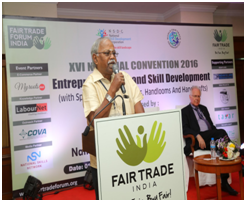 The session was chaired by Dr. K Panchaksharam. Recalling Mr Sharma’s contributions to the Fair Trade Movement in India, Mr Panchaksharam remembered how, as a renowned educationist and social entrepreneur, Mr Sharma had started Tara during 1970s in order to help the marginalized people.
The session was chaired by Dr. K Panchaksharam. Recalling Mr Sharma’s contributions to the Fair Trade Movement in India, Mr Panchaksharam remembered how, as a renowned educationist and social entrepreneur, Mr Sharma had started Tara during 1970s in order to help the marginalized people.
He was one of the honorary members of WFTO and agreed to host the FTF National Secretariat in Delhi. Later, through the years, Tara became a leading initiative and Mr. Sharma lead the Fair Trade Forum by being the president from 2003- 2009, till his passing away.
Dr. Panchaksharam introduced Mr David Wilcox, a resident of Brookline Massachusetts and an alumnus of the Harvard Business School. Mr Wilcox founded ReachScale for helping social entrepreneurs scale and widen their impact.
Mr Wilcox began his lecture with 4 data points that were in the form of comments on the earlier speakers.
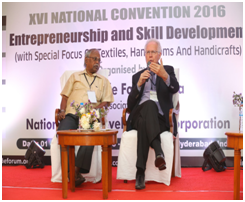 1: Recalling his recent visit to Ahmedabad, he said that there are many more members in the artisan community and hence the actual number projected by FTF-I is not accurate. Even though they may not be formal members, they are spiritually engaged in a much larger quest and lots of people are working for this cause.
1: Recalling his recent visit to Ahmedabad, he said that there are many more members in the artisan community and hence the actual number projected by FTF-I is not accurate. Even though they may not be formal members, they are spiritually engaged in a much larger quest and lots of people are working for this cause.
2: With reference to point made by an earlier speaker regarding the need for village products to meet global standards, he cited the example of products being shipped to Ikea from India. He also gave the example of Mr. Sam Pitroda whom he met in the recent NASSCOM meeting in Bengaluru. He exhorted the efforts of Mr.Pirtoda in putting India global communication system on the world map, almost 35 years ago with a budget of 35 million USD. This point should make us think about how our investments should get us results and make a global mark and it can become the benchmark for assessing the probability of investments yielding similar results.
3: He also said that while looking for opportunities he discovered that top 5 of the 10 scaling initiatives had started in India.
4: Referring to the comment from Mr Jaikant Singh on 0.9 % entrepreneurship in India, Mr Wilcox said that Fair Trade will scale it to another 60million making it 5.4% and most will be women. This is a phenomenal opportunity, which cannot be accomplished with skill development alone. Hence there is a need for networking to deliver products and capture 2% of the global market. Alongside, the women who have capital should generate work for others, find partners, funds and scale up.
He also mentioned 3 core concepts surrounding the purpose, the need for networks and collaboration in scaling: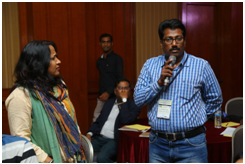
- We need to choose and embrace the purpose and on a parallel level, there is a dire need for honest networking.
- One should not practice networking only when there is a need, but do it all through for consistent engagement.
- Conversations within the network can be very powerful in scaling and any collaboration should be built on mutual trust.
The Sharma Memorial Lecture was followed by a Cultural Programme that enlivened the evening, before the networking dinner.
Day – 2
Session -1Building scalable and sustainable skill development models at the grassroots level- working hand-in-hand with government and corporates
 Dr. Gayathri Vasudevan, CEO, LabourNet, began her interactive presentation by informing the audience about how LabourNet has been able evolve a successful business model by working closely with the government and corporate sectors.
Dr. Gayathri Vasudevan, CEO, LabourNet, began her interactive presentation by informing the audience about how LabourNet has been able evolve a successful business model by working closely with the government and corporate sectors.
Gayathri explained how skill development and industry-integrated training provides better scope for sustainable models of livelihood with monthly wages, safety and social security. She provided examples from the construction, manufacturing and many industries in the MSME sector have tremendous scope for formalizing of informal knowledge and skills through RPL initiatives. She also spoke about the relevance and value of short-term vocational training for livelihood enablement, better productivity and scalability.With an example from Apparel industry, she explained the need to productize the process and apply principles from manufacturing helps in connecting with markets and continuously deal with them. She briefed the audience about various initiatives from Government of India like PMKVY and RPL that can help the weavers and artisans working in the handloom and handicraft sector
Session -2The interactive session was followed by a Keynote Session that had five speakers: Mr. Mazhar Hussain, COVA, Prof. Ramana, XIMB, Ms. Sreerekha Madivala :Myroots.desi, Mr. Jaikant Singh, NSDC and Mr Chitra K C, WFTO – Asia. The session was chaired by Mr. Mallikarjun Iytha.
Reclaiming economy for the people: through 3 paradigm shifts :Mr Mazhar Hussain, COVA – keynote speech on the relevance of fair trade practices
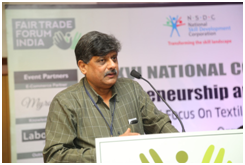 COVA has been working towards peace in south Asia, communal harmony and now got into economic empowerment and promotion of justice. Mr. Mazhar quoted a study at the BRICS summit that has concluded that the present economy is not for the people and it is designed for corporates and businesses He stressed on the need for reclaiming the economy since people don’t figure in thinking or making decisions. Voicing his preference for entrepreneurship, she said that skills are important for employment but entrepreneurship needs to be promoted. For this, we need a paradigm shift at the levels of mind set. This includes need to move towards an entrepreneurship economy.Banks should make lending to the poor profitable. We need to facilitate global access to the small entrepreneurs
COVA has been working towards peace in south Asia, communal harmony and now got into economic empowerment and promotion of justice. Mr. Mazhar quoted a study at the BRICS summit that has concluded that the present economy is not for the people and it is designed for corporates and businesses He stressed on the need for reclaiming the economy since people don’t figure in thinking or making decisions. Voicing his preference for entrepreneurship, she said that skills are important for employment but entrepreneurship needs to be promoted. For this, we need a paradigm shift at the levels of mind set. This includes need to move towards an entrepreneurship economy.Banks should make lending to the poor profitable. We need to facilitate global access to the small entrepreneurs
Hence, unemployed should be oriented to become self-employed and they should be trained through online courses on entrepreneurship Registration of business should be made compulsory for access to credit. Government can be a facilitator in achieving these goals.
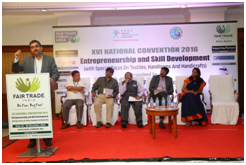 Prof. Ramana, from XIMB informed the audience about various technology led initiatives for ensuring knowledge transfer, transparency of processes and accountability. He was referring to the large number of vendors on streets (Business on Street – BOS) and how they can be empowered for sustaining their business. People who are already into business, have been using different skills and they need further empowerment. Those at the bottom of the pyramid will not have time for attending formal training and hence skilling should happen at their doorstep. He presented the School for Business on Streets (S-BOS) model that offers 3 solutions:
Prof. Ramana, from XIMB informed the audience about various technology led initiatives for ensuring knowledge transfer, transparency of processes and accountability. He was referring to the large number of vendors on streets (Business on Street – BOS) and how they can be empowered for sustaining their business. People who are already into business, have been using different skills and they need further empowerment. Those at the bottom of the pyramid will not have time for attending formal training and hence skilling should happen at their doorstep. He presented the School for Business on Streets (S-BOS) model that offers 3 solutions:
- Vendor Lite is a mobile app that uses ‘copyleft’ principles and can be downloaded from Google Play Store. It teaches the vendors about the inflow and outflow of cash and captures transactions with complete data security and options to convert to cloud.
- org is a website that aggregates information about street vendors and it has the potential to become the most popular portal for 2,20,0000 street vendors in India
- The third solution is a yet-to-be launched Virtual Knowledge Center for empowering the vendors with knowledge and skills.
These solutions address specific needs of vendors that could not be achieved through conventional training and uses technology based decentralized skill training
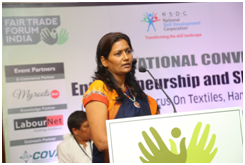 Ms. Sreerekha Madivala: Myroots.desi .Ms Sreerekha provided an overview of the portal along with the benefits.As a dedicated e-commerce portal for Fair Trade products MyRoots.desi aims to connect Indians with their roots. Ms Sreerekha said that the portal will create an avenue for the people at the grassroots with global market.It will reduce clutter by offering unique Indian products that have a story to tell and create a curated hub that follows the trends, demands and use social media for brand awareness
Ms. Sreerekha Madivala: Myroots.desi .Ms Sreerekha provided an overview of the portal along with the benefits.As a dedicated e-commerce portal for Fair Trade products MyRoots.desi aims to connect Indians with their roots. Ms Sreerekha said that the portal will create an avenue for the people at the grassroots with global market.It will reduce clutter by offering unique Indian products that have a story to tell and create a curated hub that follows the trends, demands and use social media for brand awareness
It will help producers with marketing and co-invest in the product (business model)
Mr. Sanjay from MyRoots.desi described the technology support for the portal and informed the audience about the advantages of e-commerce and the opportunities if offers for scaling and sustaining business.
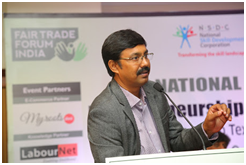 Mr. Jaikant Singh, NSDC: He began the presentation by describing the need for creating an inclusive skilling ecosystem in India and how FTF-I can play a major role in this endeavor.He drew a parallel between the corporate and the skilling industries by explaining how placements are important to make the programs successful, and how self-employment is aiding the placement scenario and it is being recognized under the government programs. He informed the audience about the scope for partnership with NSDC for scaling up various small initiatives. He spoke about how the government is directing all the efforts for inclusive growth through skill development and entrepreneurship.
Mr. Jaikant Singh, NSDC: He began the presentation by describing the need for creating an inclusive skilling ecosystem in India and how FTF-I can play a major role in this endeavor.He drew a parallel between the corporate and the skilling industries by explaining how placements are important to make the programs successful, and how self-employment is aiding the placement scenario and it is being recognized under the government programs. He informed the audience about the scope for partnership with NSDC for scaling up various small initiatives. He spoke about how the government is directing all the efforts for inclusive growth through skill development and entrepreneurship.
He also informed the audience about the need to change the thought process in employment options and how implementation and execution is a big challenge in skill development. Even though self-employment is considered as good as placement, he felt that there’s no standard way of measuring the impact of self-employment.
He re-iterated that FTF- I is the right match for skilling and entrepreneurship training as it covers 5.4% of the target segment. He talked about the possibilities of financial support by NSDC through providing micro finance facility at 4% interest and at other favorable terms. He talked about how NSDC can help FTF-I or the traders through accreditations by creating new Qualification Packs (QPs) and National Occupational Standards (NOS). He discussed about the need to glorify skill development and make it aspirational.He said about being open for innovative interventions also and not just for funds.
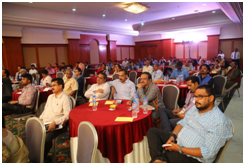 He pointed out that FTF-I members can work together with existing training partners, work directly with NSDC or form an umbrella body to work with NSDC.He identified how FTF – I is working for the 80% of the country’s population who don’t get a chance to graduate and how it can make a huge difference by creating self-employment. He talked about bringing the unorganized sector together as they provide 95% jobs.He said, mentoring is as important aspect in skill-development of marginalized vendors and workers and it can be facilitated by encouraging the graduate and post-graduate students to adopt mentoring as a project so that they can help the underprivileged and marginalized vendors and workers learn the skills of documentation etc. He highlighted the fast growth of Yoga and naturopathy as an industry and how FTF – I can leverage this change by adopting“act local think global” ideology. He finally re-enforced his commitment towards FTF-I.
He pointed out that FTF-I members can work together with existing training partners, work directly with NSDC or form an umbrella body to work with NSDC.He identified how FTF – I is working for the 80% of the country’s population who don’t get a chance to graduate and how it can make a huge difference by creating self-employment. He talked about bringing the unorganized sector together as they provide 95% jobs.He said, mentoring is as important aspect in skill-development of marginalized vendors and workers and it can be facilitated by encouraging the graduate and post-graduate students to adopt mentoring as a project so that they can help the underprivileged and marginalized vendors and workers learn the skills of documentation etc. He highlighted the fast growth of Yoga and naturopathy as an industry and how FTF – I can leverage this change by adopting“act local think global” ideology. He finally re-enforced his commitment towards FTF-I.
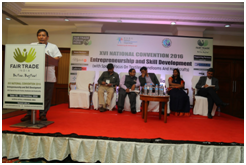 Mr Chitra K C, WFTO, informed the audience about the Guarantee System and shared many details about it. The Guarantee System was adopted in 2015 in Rio and it has some key objectives. It justifies to customers and markets about the genuine Fair Traders, while certifying the member’s compliance with 10 principles of Fair Trade. There are three main advantages of becoming a member by following the process:
Mr Chitra K C, WFTO, informed the audience about the Guarantee System and shared many details about it. The Guarantee System was adopted in 2015 in Rio and it has some key objectives. It justifies to customers and markets about the genuine Fair Traders, while certifying the member’s compliance with 10 principles of Fair Trade. There are three main advantages of becoming a member by following the process:
- Self-assessment report, verify against the 10 principles of fair trade
- Follow consistent branding, logo, open up markets
- Answer the critics with real info
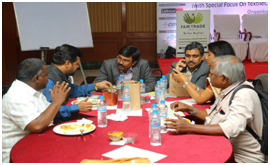 Connecting the dots over lunch: e-commerce, guarantee system, skilling initiatives: The participants were divided into groups to facilitate interaction with the respective speakers to explore opportunities and seek clarity about processes and advantages.
Connecting the dots over lunch: e-commerce, guarantee system, skilling initiatives: The participants were divided into groups to facilitate interaction with the respective speakers to explore opportunities and seek clarity about processes and advantages.
Session -3: The post-lunch session on “Successful social entrepreneurship models Innovative models” was chaired by Mr David Wilcox. The speakers included Ms. Uma Prajapathi , Founder, Upasana, K S Gopal , Founder, Center for Environment Concerns (CEC), Mr. YashRanga, Jaipur Rugs Foundation and Mr Marmik Joshi from Craftroot
Mr Wilcox expressed the need for change in mindset with regard to entrepreneurship and employment. He said that the poor and underprivileged should be recognized for their talent and they should be shown opportunities for entrepreneurship rather than connect them with jobs. This can create sustainable model for grassroots level empowerment through self-employment.
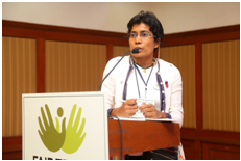 Ms. Uma Prajapathi , Founder,Upasana narrated inspiring stories about herpassion to make business work for people, by using design for social change. She cited the example of the Tsunamika doll that have become the symbol of gift economy. She went on to describe how all her ventures are sustainable while making a difference in the lives of people. Upasana connects fashion to grassroots community and touch our lives in simple ways while being socially conscious. Her another venture, Paruthi,works with farmers through organic cotton project. Small Steps bags and other initiatives have combined green campaigns while enabling livelihoods successfully. Janaki is the retail chain that sells products from various artisans
Ms. Uma Prajapathi , Founder,Upasana narrated inspiring stories about herpassion to make business work for people, by using design for social change. She cited the example of the Tsunamika doll that have become the symbol of gift economy. She went on to describe how all her ventures are sustainable while making a difference in the lives of people. Upasana connects fashion to grassroots community and touch our lives in simple ways while being socially conscious. Her another venture, Paruthi,works with farmers through organic cotton project. Small Steps bags and other initiatives have combined green campaigns while enabling livelihoods successfully. Janaki is the retail chain that sells products from various artisans
K S Gopal, Founder, Center for Environment Concerns (CEC), talked about the initiatives at CEC and in particular about the SVAR project. CEC has been exploring alternative irrigation systems for sustainable agriculture since the current irrigation systems depend on luxury of water. SVAR is a highly water efficient irrigation system that retains moisture. It is automated while it works without electricity. It combines modern science and technology to educate the farmer about the advantages of the innovative system
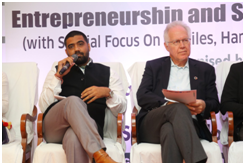 Mr. YashRanga, Jaipur Rugs Foundation spoke about the impact of the foundation on the lives of weavers and how carpets are not mere products. Weaving a carpet could help someone in earning a livelihood or in buying medicine or pay for a child’s education. He spoke in detail about how Jaipur Rugs has touched global border with a sustainable and scalable model. Jaipur Rugs links the poorest with richest with the business model, not tweak the natural lifestyles, go to their doorstep and train them.It helps the weavers go higher into value chain, 360 degree development social development – education to women, link them government scheme, financial inclusion.
Mr. YashRanga, Jaipur Rugs Foundation spoke about the impact of the foundation on the lives of weavers and how carpets are not mere products. Weaving a carpet could help someone in earning a livelihood or in buying medicine or pay for a child’s education. He spoke in detail about how Jaipur Rugs has touched global border with a sustainable and scalable model. Jaipur Rugs links the poorest with richest with the business model, not tweak the natural lifestyles, go to their doorstep and train them.It helps the weavers go higher into value chain, 360 degree development social development – education to women, link them government scheme, financial inclusion.
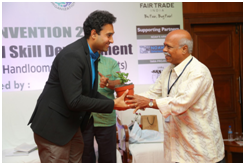 Mr. Marmik Joshi from Craftroots shared his experience with Gramshree that was started in 1995 by the Former CM of Gujarat, Ms Anandiben Patel for empowering home based women. These women were taught weaving techniques, textile products and handicrafts. The organization has achieved sustainability with more than 25000 artisans, more than 2000 women. Regarding the objective and roadmap for Craftroots, he said, the objective is promote and save handicrafts of the country through strategic marketing and by opening e-store, airport kiosks India and abroad, exhibition tours.He also talked about the importance of going international through e-commerce, going niche, creating awareness about the process – telling about artisans, geo-tag the product focus on artisan stories and craft stories
Mr. Marmik Joshi from Craftroots shared his experience with Gramshree that was started in 1995 by the Former CM of Gujarat, Ms Anandiben Patel for empowering home based women. These women were taught weaving techniques, textile products and handicrafts. The organization has achieved sustainability with more than 25000 artisans, more than 2000 women. Regarding the objective and roadmap for Craftroots, he said, the objective is promote and save handicrafts of the country through strategic marketing and by opening e-store, airport kiosks India and abroad, exhibition tours.He also talked about the importance of going international through e-commerce, going niche, creating awareness about the process – telling about artisans, geo-tag the product focus on artisan stories and craft stories
Session -4: The next session on Fair Trade Guarantee System and WFTO was chaired by Mr. Johnny Joseph. The speakers included Mr Chitra KC, and Ms. Patwira Narasri, Sustainability Coordinator, WFTO guarantee system.
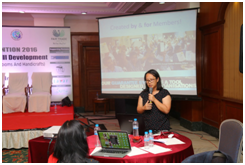 Mr. Chitra KC requested Ms. Patwira to make her presentation on the Guarantee System. She informed the audience about the genesis of Guarantee system and how it is the equivalent of certification and it opens up new markets.It is based 10 principles of Fair Trade. At present, Fair Trade is being followed by 75 countries and the office of WFTO Asia is based in Thailand with global office in the Netherlands. She shared the details about the membership. There are 3 types of memberships FTO, Fair Trade Organisation; FTN Fair Trade Network; FTSO Fair Trade Support Organisation. To qualify for guarantee system, a company needs to exist for 2 years and be committed to the 10 principles and other prerequisites; the companies are given 2 years to develop strategy and organization. This is followed by peer visit and periodic auditing. There is provision for volunteer internship program and events to promote small and disadvantaged producers. More details about the membership procedure are available on the website: http://www.fairtradeforum.org/
Mr. Chitra KC requested Ms. Patwira to make her presentation on the Guarantee System. She informed the audience about the genesis of Guarantee system and how it is the equivalent of certification and it opens up new markets.It is based 10 principles of Fair Trade. At present, Fair Trade is being followed by 75 countries and the office of WFTO Asia is based in Thailand with global office in the Netherlands. She shared the details about the membership. There are 3 types of memberships FTO, Fair Trade Organisation; FTN Fair Trade Network; FTSO Fair Trade Support Organisation. To qualify for guarantee system, a company needs to exist for 2 years and be committed to the 10 principles and other prerequisites; the companies are given 2 years to develop strategy and organization. This is followed by peer visit and periodic auditing. There is provision for volunteer internship program and events to promote small and disadvantaged producers. More details about the membership procedure are available on the website: http://www.fairtradeforum.org/
Session on Branding and Market Intelligence with Mr Pradeep Krishnappa, Founder The Ants, and Mr. Mathew John
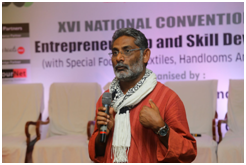 There have been sustained efforts at branding at the domestic level for securing presence by hiring an external consultant. The key messaging has been around how Fair Trade India Brand benefits peoples, how it has impacted livelihoods by blending commercial value with ethics. Mr. Mathew spoke about the focus on domestic markets and the need for time to communicate the value of the brand and people should be convinced about the value.Mr Pradeep described the efforts at consistent branding for retail business modeland the availability of product lines in all the branded shops. This will help in empowering grassroots artisans, be transparent to the consumer and use FTF as an umbrella brand.He talked about identifying and segmenting the target markets (bulk retailers, corporate markets) and creating a roadmap. He said access to day-to-day data is important for retail to sustain, connecting the brand with the product lines, its value and need for training the staff.The need for the brand resonates with the people through compelling visual communication and use of social media, one-to-one store communication, participate in fair trade exhibitions. He stressed upon how a brand needs to appreciate from members’ brand to consumers’ brand to become successful.
There have been sustained efforts at branding at the domestic level for securing presence by hiring an external consultant. The key messaging has been around how Fair Trade India Brand benefits peoples, how it has impacted livelihoods by blending commercial value with ethics. Mr. Mathew spoke about the focus on domestic markets and the need for time to communicate the value of the brand and people should be convinced about the value.Mr Pradeep described the efforts at consistent branding for retail business modeland the availability of product lines in all the branded shops. This will help in empowering grassroots artisans, be transparent to the consumer and use FTF as an umbrella brand.He talked about identifying and segmenting the target markets (bulk retailers, corporate markets) and creating a roadmap. He said access to day-to-day data is important for retail to sustain, connecting the brand with the product lines, its value and need for training the staff.The need for the brand resonates with the people through compelling visual communication and use of social media, one-to-one store communication, participate in fair trade exhibitions. He stressed upon how a brand needs to appreciate from members’ brand to consumers’ brand to become successful.
“Mann ki baat” was short session in seeking the honest opinion and views from the audience. Ms. Roopa Mehta shared her thoughts on how the members should network with government and corporates on their own terms by emphasizing the unique identity of FTF. This is mainly because FTF has successfully created its own space and there is need to be neutral, apolitical and non-religious. Few other members from the audience shared their perspectives and expectations in this session.
 The concluding session had Mr. Krishna Sagar Rao, author and motivational speaker engaging the audience in a conversation around the theme of his book “Summit your Everest”. He narrated the inspiring story about reaching the peak and how it had lessons on overcoming obstacles and failure management, despite adversities how one can have many achievements. He talked about how obstacles can be handled and transformed into opportunities by being a free individual. He also said that, emotional intelligence – personal and professional effectiveness and our thought processes make us unique. He said, “we satisfy our emotions through our actions, every conflict resolutions is connected with emotions – express and impress people”.He talked about the need to balance our feelings, thoughts and emotions
The concluding session had Mr. Krishna Sagar Rao, author and motivational speaker engaging the audience in a conversation around the theme of his book “Summit your Everest”. He narrated the inspiring story about reaching the peak and how it had lessons on overcoming obstacles and failure management, despite adversities how one can have many achievements. He talked about how obstacles can be handled and transformed into opportunities by being a free individual. He also said that, emotional intelligence – personal and professional effectiveness and our thought processes make us unique. He said, “we satisfy our emotions through our actions, every conflict resolutions is connected with emotions – express and impress people”.He talked about the need to balance our feelings, thoughts and emotions
The third day of the conference hosted the Annual general Meeting 2016.
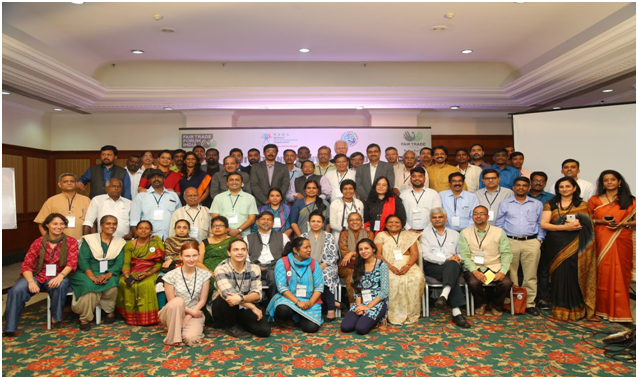
Recommendations:
- To achieve the entrepreneurship levels of 5.4% in India, it was proposed that women’s skill development is critical and emphasis should be given on this aspect.
- To make skill development aspirational, NSDC can introduce special accredation packages creating new Qualification Packs (QPs) and National Occupational Standards (NOS) which FTF – I can promote amongst its members and partners. Such an initiative can promote self-employment and entrepreneurship amongst them.
- Fast growth of Yoga and naturopathy as an industry can be leveraged by FTF – I by adopting “act local think global” ideology.
- Brand Fair Trade India, needs to be made consumers’ brand rather than a member’s brand by highlighting the various aspects of Fair Trade through sensitization programs and identifying the target markets
- Focus should be on technology to facilitate skill development and improve access to markets through e-commerce. It brings simplicity and transparency to the processes and promotes accountability.